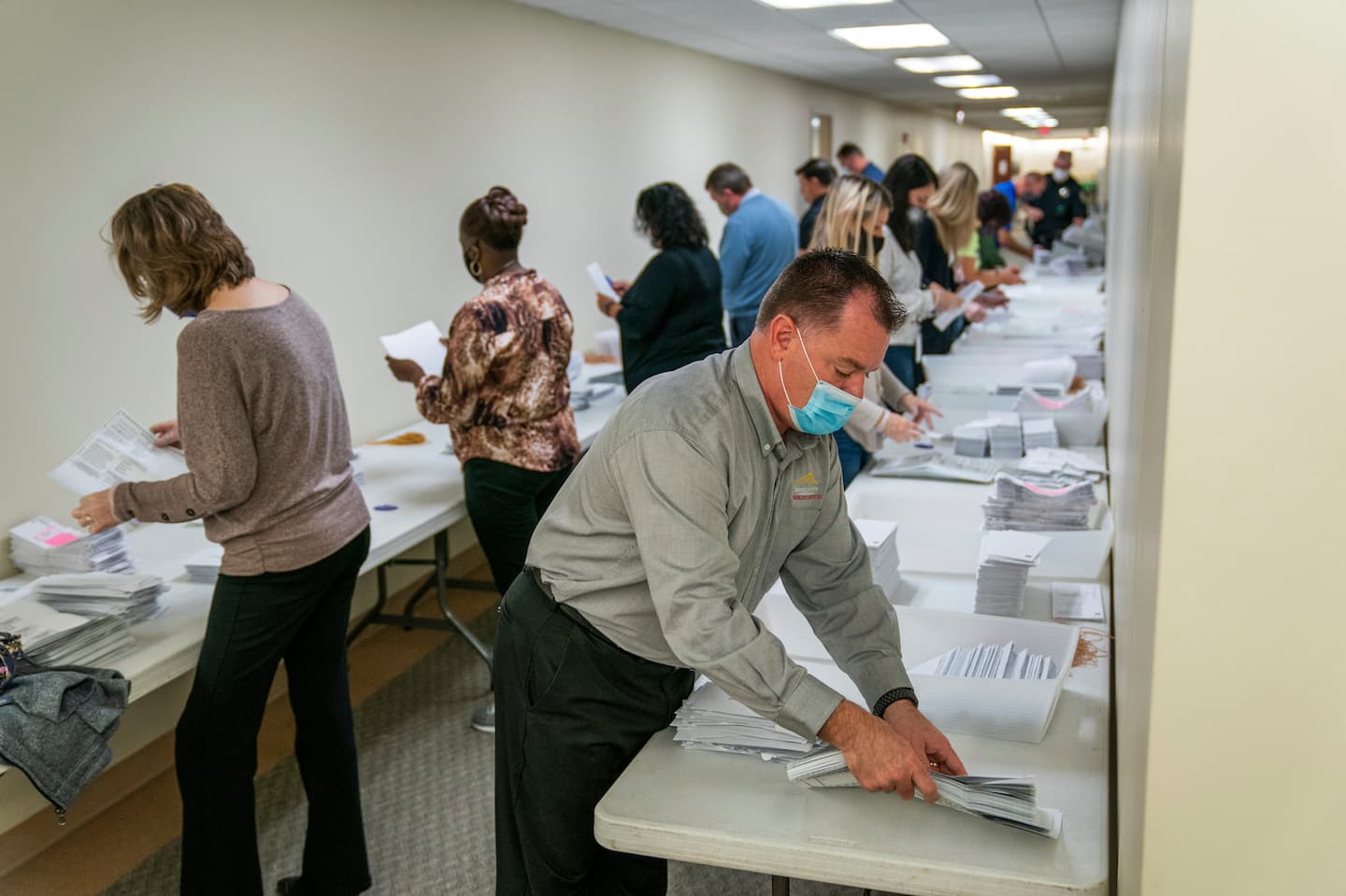Trump wants the courts to stop the counting. He’s going to be disappointed.

In his remarks early Wednesday morning, Trump seemed to suggest that the court might halt the counting of all ballots that remain untallied. That is sheer nonsense. The vast majority of uncounted ballots suffer from no legal infirmity whatsoever. Many arrived at their local election offices weeks ago, piling up waiting to be counted because of misguided state laws that did not permit the process to start until Election Day or, in the case of Michigan, the day before.
The fact that local officials could not make it through the unprecedently large pile in a single day is no basis for discarding those ballots — or for disenfranchising the eligible voters who properly cast them. There is not one iota of possibility that the U.S. Supreme Court, or any court, would disqualify those ballots.
These ballots are not the hanging chads of Bush v. Gore. That case involved something genuinely susceptible to judicial determination: whether it was a violation of the equal protection clause of the Constitution for identically cast Florida ballots to be treated differently in a statewide recount depending on whether they were in Miami or Palm Beach.
That’s not the situation now. The remaining uncalled states, where not even unofficial winners have been projected by the media, are not yet in a recount situation. Vast numbers of ballots have not yet been counted for the first time. Until that happens, it’s premature to imagine that this election, as in 2000, might be decided in court.
Of course, multiple lawsuits have already been filed, and more are surely on the way. In Nevada, Republicans challenged the methods for verifying voters’ signatures on mail-in ballots. In Pennsylvania, a new lawsuit by Republicans attacks efforts to help voters “cure” clerical difficulties with mail-in ballot envelopes, such as whether they left the ballots “naked” instead of using the required inner sleeve.
But without knowing the margins of victory in particular states and the preliminary electoral college tally, it is too early to say whether any of this litigation matters. It could come to that, if it turns out there is a narrow slice of disputed ballots in a state whose outcome could determine the election. In such a situation, the federal courts and ultimately the Supreme Court could get involved.
The most likely such scenario involves Pennsylvania, and the counting of ballots that were to arrive within three days after Election Day. The Pennsylvania Supreme Court granted this three-day extension, the issue has already reached the Supreme Court twice, and both times the court declined to insert itself.
The Trump campaign sought Wednesday to intervene in the next phase of this case, which remains pending before the court. If Pennsylvania’s 20 electoral votes would determine the presidency, this dispute takes on extraordinary new importance.
There is a conceivable argument that the ballots falling within this three-day window cannot be counted. The statute that the Pennsylvania legislature enacted on this point explicitly declared that ballots must arrive by Election Day. The Pennsylvania Supreme Court, relying on the state’s constitution, ruled that this statutory deadline must be expanded by three days because of difficulties created by the pandemic and problems with the U.S. Postal Service.
Republicans have claimed that the state Supreme Court’s ruling violates the federal Constitution, which grants the power to write rules governing elections to state “legislatures.” The U.S. Supreme Court has yet to decide the question of what, if any, authority that leaves to state courts; that’s the difficult and important issue that it has ducked so far.
But even if the court were to agree with the Republicans on their federal constitutional claim, it is doubtful that a majority of justices — having allowed the state court extension to remain in place — would also agree to invalidate ballots that benefited from the extra time.
Courts often talk about reliance interests and have recognized that these are particularly important in the context of elections: the ability of voters to know what the rules of the road are and to act accordingly. Voters who relied on the state Supreme Court’s ruling were complying with the law as it existed and they reasonably understood it. The justices could correct the state Supreme Court’s error for the future and still let these ballots be counted.
That would be a wise way out for conservative justices. Neither the court nor the country would benefit from the justices once again intervening to determine the presidency — no matter how loudly Trump demands it.
Read more:






